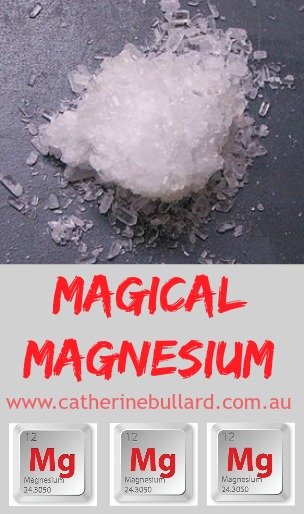My sister has a beautiful bathroom with a big, deep bath in it. Like most people she knows baths are great for relieving tired and aching muscles and bringing on great sleep. And she knows adding epsom salts to the bathwater makes it even more effective. But what she doesn’t know is that epsom salts are rich in the mineral magnesium. Many people are also deficient because magnesium is poorly absorbed. Plus our western diets often lack magnesium. But soaking in a bath containing Epsom salts is a way to boost your magnesium levels. You avoid the problem of poor absorption in the gut because magnesium is absorbed very easily through the skin. Discover the health benefits of magnesium and epsom salts below.

MAGNESIUM DEFICIENCY
Most of the population does not get enough magnesium. In 2000 the National Health and Nutrition Examination Survey (in USA) found as many as 80% of adults were deficient, a figure most likely mirrored here in Australia. This figure is significant because the mineral magnesium plays a part in thousands of functions in your body. Also, magnesium is easily depleted. Problematically, magnesium deficiency is often overlooked because it manifests differently in each individual.
The mineral magnesium, plays a vital role in building and maintaining good health, working in conjunction with many other nutrients, particularly calcium and Vitamin D.
Most people know that they need calcium. And there’s also growing awareness of the importance of Vitamin D. But the third side of this triangle is perhaps not so well known about. Magnesium also plays a part in this picture. While magnesium deficiency is quite widespread due to deficient intake, it’s often not addressed with diet or supplementation in the same way calcium is.
MAGNESIUM, CALCIUM, VITAMIN D: THE MAGIC TRIANGLE
 Magnesium, calcium and vitamin D work in unison in the body. All three require the others to actually do their job. It doesn’t matter if you’re getting adequate amounts of one of them, without the others it will not be able to do its job. Which means taking calcium supplements without sufficient magnesium is not much use. Your body needs about twice as much calcium as magnesium, but many people actually have much more calcium and many times less magnesium.
Magnesium, calcium and vitamin D work in unison in the body. All three require the others to actually do their job. It doesn’t matter if you’re getting adequate amounts of one of them, without the others it will not be able to do its job. Which means taking calcium supplements without sufficient magnesium is not much use. Your body needs about twice as much calcium as magnesium, but many people actually have much more calcium and many times less magnesium.
Magnesium is the fourth most abundant element in your body. It helps regulate over three hundred enzymes. It also plays a vital role in muscle control and sending electrical impulses along the nerves. Magnesium contributes to energy production and also assists in the elimination of toxins.
Many common diseases of our modern life can be rooted in a magnesium deficiency. And it can lead to heart disease, stroke, osteoporosis, arthritis and joint pain, digestive disorders, chronic fatigue, or illnesses resulting from stress. Research shows magnesium deficiency contributes to SIDS. Long term chronic magnesium deficiency damage can even be fatal.
When we talk of muscles everyone usually thinks of those in the legs or back. Most people have experienced muscle cramps at some time often in the legs or feet. But how many also think of their heart as also being a muscle? Low magnesium levels can affect the efficient working of your heart, in the same way they can lead to cramping of your leg muscles.
MAGNESIUM DEFICIENCY SYMPTOMS
Some early symptoms of a magnesium deficiency:
- Restlessness
- Muscle cramps, tremors & twitches
- Restless or fidgety legs
- Pain in the feet
Some other indicators of a possible magnesium deficiency:
- Migraines, cluster headaches
- Anxiety, stress & panic attacks
- Fatigue, sluggishness. People with Chronic Fatigue Syndrome often are also eating a magnesium deficient diet.
- Poor sleep & waking tired – difficulty falling asleep or waking with stiffness
- Low energy levels
- High blood pressure and cholesterol levels
- Period pain and PMS – Deficiency can also lead to infertility and pregnancy problems
- Nervousness – heightened sensitivity to external stimuli like lights and noise, with exaggerated emotions
- Irritability – Irritability of the nervous system. Depression, restlessness, psychiatric conditions including bipolar and epilepsy .
- Kidney stones
- Poor memory
- Confusion
- Calcium or potassium deficiency
- Autism spectrum, ADD/ADHD, other neurological conditions
HEALTH BENEFITS OF MAGNESIUM RICH FOODS
 Good food sources of magnesium are whole grains and green leafy vegetables, as well as legumes and nuts. Although grains and seeds are normally rich sources of magnesium the processing destroys it. Therefore they’re left with very low levels, or often no magnesium at all in the finished food. This is because the magnesium is in the parts of the plant that are removed in refining. Even if you eat foods that are normally magnesium rich, they won’t be unless they’re in their unprocessed form.
Good food sources of magnesium are whole grains and green leafy vegetables, as well as legumes and nuts. Although grains and seeds are normally rich sources of magnesium the processing destroys it. Therefore they’re left with very low levels, or often no magnesium at all in the finished food. This is because the magnesium is in the parts of the plant that are removed in refining. Even if you eat foods that are normally magnesium rich, they won’t be unless they’re in their unprocessed form.
As well, modern farming practices result in magnesium deficient soils, so crops growing in those soils also contain very low levels of magnesium. Foods that should be rich in magnesium no longer are.
On top of the problem with our foods, there are a number of factors that speed up the depletion of magnesium in our body. Here are some of them:
Magnesium Drainers
- Hardly surprisingly our western diet which is high in breads, pasta, cereal, biscuits and more contributes to magnesium deficiency.
- Sugars, fats, salt and proteins in our diet all deplete magnesium.
- Diuretics, such as caffeine, even just one coffee a day, can cause it.
- Alcohol is another form of diuretic, and weekend binge drinking could result in your body dumping a load of magnesium.
- Medications for blood pressure deplete magnesium.
- Chronic low-grade stress causes magnesium deficiency
If you recognise yourself in any of these scenarios have your magnesium levels tested with a view to adding a supplement.
Even if your diet is really well balanced, you may still need a magnesium supplement. Select magnesium supplements in the form of magnesium citrate because it’s better absorbed. Another way to supplement successfully is to apply magnesium oil (magnesium chloride) to your skin.
Here is a complete list of magnesium rich foods, but remember that the levels may not be as high as they should be, depending on the growing situation and any processing of the food.
EPSOM SALT BATH
An epsom salt bath is a brilliant way to get the health benefits of magnesium and reduce stress at the same time.
 Add about 1-2 cups of Epsom Salts to the tub. Dissolve them in hot water first and then fill the tub about half full with water as warm as you can tolerate. The warmer the water and the bigger the tub, the more salt will dissolve.
Add about 1-2 cups of Epsom Salts to the tub. Dissolve them in hot water first and then fill the tub about half full with water as warm as you can tolerate. The warmer the water and the bigger the tub, the more salt will dissolve.
If you suffer chronic deficiency start with just a tablespoon of salt and work your way up to the full amount to avoid any negative reactions. Soak for about twenty minutes. You can leave the salt to dry on your skin or rinse it off. Don’t drink the water!
If you don’t have a big tub use a foot bath instead. Mix 1 part salt to 2 or more parts water and soak for 20-30 minutes.
‘LECTRIC SODA
Just one warning note about Epsom Salts…Lectric Soda found on supermarket shelves is not Epsom salts. It is made from limestone (calcium carbonate) processed with sodium chloride. Epsom Salts are magnesium sulphate. Look for the real deal.
And if you’re a gardener you may already know that Epsom salt is magic in your garden. It helps seeds germinate, makes plants grow bushier, produces more flowers, increases chlorophyll production and deters pests, such as slugs. It also provides vital nutrients to supplement your regular fertilizer (or compost!).
The health benefits of magnesium are extensive for both people and plants. It’s essential to consider your magnesium status and make any changes to stay happy and healthy.

Disclaimer
All information and opinions presented here are for information purposes only. They are not intended as a substitute for professional advice offered during a consultation with your health care provider. Do not use this article to diagnose a health condition. Speak to your doctor if you think your condition may be serious or before discontinuing any prescribed medication. Please consult with your health care provider before following any of the treatment suggested on this site, particularly if you have an ongoing health issue.
Source articles
http://www.calmnatural.com/magnesium-deficiency


